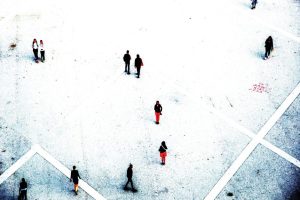 The scarcity of our most precious resource will make you rethink your morning shower.
The scarcity of our most precious resource will make you rethink your morning shower.
From her mud-walled hut in the village of Gutu Dobi, Ethiopia, Loko Dadacha can see a milky brown sliver on the horizon. She makes the four-hour round trip to the stream and carries back 5 gallons of water—about 40 pounds—in a yellow jerrican harnessed to her back with bits of rough rope. She and most other women and girls in the village do this every day.
During times of rain, there's a pond in Dadacha's village, but the water is brown, according to Coco McCabe of Oxfam America.
"When there's a drought, you have no way to make money," McCabe explains, noting the impact on crops and cattle. Dadacha collects wood to support her three children still living at home and makes the long journey for water despite having just one meal a day.
Dadacha's story is not unique. Around the world 1 billion people don't have access to safe water and some 2.5 billion live without adequate sanitation. These conditions lead to 3.5 million deaths every year from water-related illnesses like cholera and dysentery, among others. Every 15 seconds a child dies from a water-related disease.
From a First World country, it can be difficult to see how water is even an issue. In our society water is as close as the nearest faucet. We brush our teeth with the water running and take 15-minute showers, brew coffee, and wash our cars, while billions around the world suffer without water. The dignity of the human person, the foundation of Catholic social teaching, directs our attention to them.
In the desert of the American Southwest, golfers whack little white balls over man-made lakes and down plush green fairways. Las Vegas is a hotel metropolis packed with fountains and toilets in the middle of the Mohave Desert. It's hard to believe that most people in the world don't have flush toilets and some don't even have latrines.
Perhaps in addition to looking toward science or politics for an answer, we can also learn something about how to approach the issue of water scarcity from a more traditional source: the Bible. After all, water is the most oft-cited natural resource in scripture.
Water saved Moses and the Israelites, but killed the Egyptians who followed them across the Red Sea. Noah's ark saved some from the great flood, but water killed the rest.
The prophets predicted drought as a punishment for infidelity to God, while rain was a blessing. In Baptism water cleanses us from sin.
"In our culture in which abundant water is instantly available with the turn of the tap, it is difficult for us to imagine how critical water was to the people of the biblical periods and why it was such an important biblical expression of life and abundance," says scripture scholar Stephen J. Binz, author of Stewardship of the Earth (Twenty-third Publications). "Because the biblical writers lived in a region where water was scarce and drought was a constant threat, water was the most dominant of all symbols for God's blessing."
While those who live with scarcity caused by both environmental and social factors don't need a reminder, the Bible can help those of us in the First World remember how vital water is to life.
Water turned to blood
Ancient people saw their gods at work in natural events. The plagues of Egypt, Binz explains, were natural calamities. The plagues unfold as a duel between the gods of Egypt, represented by the pharaoh, and the God of Israel, whose will is revealed through Moses.
"The plagues, beginning with the waters of the Nile turning to blood, are described as the result of Pharaoh's failure to maintain the cosmic order in his realm and the spiritual health of his people," Binz says. "The blood-red color of the river is some form of pollutant that made the water undrinkable and foul so that the fish could not survive."
The plagues reveal that the sinfulness of human beings can disrupt the natural order of God's creation.
Water is often thought of as a renewable resource, and on one level it is. Even contaminated water, given time, will be purified through the hydrologic cycle. Yet unnatural chemicals—such as fertilizers, pesticides, and organic chemicals—can overwhelm the renewal process, says Paul G. Heltne, director of the Center for Humans and Nature in Chicago.
Heltne also notes that the human population is drawing massive amounts from known aquifers. The Ogallala Aquifer, in the central Midwestern United States, was deposited about 10 million years ago and enables the High Plains to be the leading irrigation area in the Western Hemisphere. But the resource is being polluted and depleted.
"Aquifers will eventually refill," Heltne says. "The problem is that it may take 10,000 years." The other problem is that the recharge that seeps through the earth into a shallow aquifer is much more susceptible to contamination.
In Tambogrande, a small town in northwestern Peru, the Sisters of Notre Dame de Namur witness an ongoing lack of access to clean water. "The people who live in the fields get their water through canals—and it isn't drinkable," says Sister Juana Rivera. "There's no way to make it drinkable because there's no way for them to boil the water."
When there is water-it rains about every 15 days-only five percent of it is potable. Chemicals from nearby mines contaminate the water supply.
After God liberated Israel from Egypt, Moses and his followers learned to appreciate God's natural blessings, says Binz.
"The disorder represented by the bloody Nile is set right and the springs of the desert become a blessing when God's people cooperate with the natural order of God's creation," Binz says. "God has made the natural order in such a way that it contains the means necessary for its own healing, and God gave humanity the ability to discover those capacities within nature that contribute to its flourishing."
Once we discover these capacities, we can cooperate with the natural order—if we are willing to do so.
Blessed are the thirsty
In the Sermon on the Mount, Jesus' followers find the heart of his message and the way to live a Christian life. Those who follow Christ not only seek to be in right relationship with God but "hunger and thirst" for others to have their due. The Beatitudes show his followers how to be God's love for one another, especially for the poor.
"To be Christian involves sacrifice, it involves the consciousness of the community, of relationality," says Franciscan Sister Ilia Delio, a professor at Washington Theological Union. Most people in developed countries aren't aware that people in poor countries are dying of thirst.
"When we see pictures of the people in Darfur who are literally dehydrating to death from lack of potable water, that really makes no difference in our ordinary lives," she says. "We seem to have all the water we need."
To thirst for righteousness is to work toward just distribution of the earth's natural resources, a distribution that just isn't happening. Last year the World Health Organization reported that 98 percent of water-related deaths happen in the developing world. Even in the United States, where water is not yet an issue, the poor are disproportionately affected.
Amid financial struggles, city officials in Highland Park, Michigan hired a consultant who recommended raising water rates and privatizing the water plant. Soon enough, despite being a few miles away from the Great Lakes, the city shut off water to 52,000 residents who couldn't pay thousands of dollars in bills. In this case scarcity is caused by political decisions, not lack of water, and the poor bear the brunt of the problem.
"We have to make sure those most vulnerable are protected, that no one is outpriced for their water," says Liz Miller, who made The Water Front, a documentary about Highland Park. "The trend now is to see water as a commodity—like oil. The problem with water is that it's a life and death issue."
Heltne thinks at least a minimum daily requirement of water is a human right. "The impact of water being treated as a commodity rather than as a right," he says, "always falls most heavily on the poor."
"It doesn't mean water should be free," says Peter Gleick, founder of the Pacific Institute. "Most of us should pay for water. The human right to water means that if people can't afford it they shouldn't be denied water."
In 2002 the United Nations formally recognized that right and has been advocating for it, as has the Holy See.
"Powerful international interests, public and private, must adapt their agendas to serve human needs rather than dominate them," Archbishop Renato R. Martino, president of the Pontifical Council for Justice and Peace, said at the Third World Water Forum in 2003. "The right to water is thus an inalienable right."
Binz also points to Psalm 24 for a scriptural basis for the right to water. "I think the general principle that ‘The earth is the Lord's' would be a good start. The fact that the earth belongs to God suggests that no one ultimately owns any of it. It is to be used justly and equitably among the peoples of the earth."
The well runs dry
Continuing population growth will likely complicate the issue of water as a human right. It's easier to ensure that right in lands with plentiful water, but what happens when there isn't enough water for everyone?
Genesis tells the story of Lot and Abram. When they come to the Holy Land, they discover that it cannot support both of their flocks, and so they go their separate ways. Lot arrives in the Jordan River valley and sees it is well watered.
Today it won't simply be a matter of going separate ways. Water scarcity means people have to share. And they're not always happy about it.
"This is one of the most significant but underreported issues involved with the division of the land today into Israel and Palestine," Binz says. "In a land where water is scarce, water rights are critical."
In the Holy Land, governments struggle for control of the water from the Sea of Galilee and the Jordan River and to decide where streams will flow. The people of Lebanon, Syria, Israel, Palestine, and Jordan all rely on the water from the Jordan River.
"It's not a big river, and the demands on it are enormous," says Gleick. Such demands have exacerbated existing rifts. "Water and politics make for a volatile mix."
In Gaza 8,000 families lost their homes and their tenuous access to water because of the strife between Israel and Hamas earlier this year. "They search for water to drink, to cook their food with, to keep their bodies and clothes clean," Mike Bailey of Oxfam International says.
Water is also a component of the crisis in Darfur. With a long drought—some estimate rainfall has decreased more than 40 percent over the last 50 years—it's another thing for the warring factions to fight about.
Journalist Stephan Faris, who covers Darfur for the The Atlantic magazine, explains how refugees in Chad get water at a border riverbed where militias also regularly water their horses. "You had to stand on the border of a country you just fled from to get water," he says. "They risk their lives to save themselves."
"Water issues are compounded by the semi-arid environment and ongoing conflict," says Debbie DeVoe, who works with Catholic Relief Services in East Africa. CRS builds and helps maintain water systems in many of the overcrowded refugee camps in West Darfur, where more than 2 million people live.
Global climate change is likely to increase water-related conflicts because it affects rainfall patterns, the frequency of storms, and the loss of snow pack. And higher temperatures will increase demand for water.
"Climate scientists are telling us we can no longer assume that the future climate will look like the past," Gleick says. Well-watered regions will get wetter and the dry areas will get drier-leaving us with more flooding and more drought.
One place to look for guidance for how to deal with this uncertain future, according to theologian Jame Schaefer, is Thomas Aquinas. The 13th-century Dominican friar developed the concept of the common good.
"To achieve the common good, God instilled in individual creatures a natural inclination toward the good of the whole," says Schaefer, a professor at Marquette University and author of Theological Foundations for Environmental Ethics (Georgetown University Press).
"The virtue of temperance will guide us in using only what is needed, while the virtue of justice will guide us to assure that others have sufficient water for their needs in temporal life as they aim for eternal happiness with God," Schaefer says. "The motivation for acting virtuously is love of God and love of one's neighbor."
In biblical times the temperate and just solution to water scarcity was to find more well-watered land rather than burden one area. Today we need to come up with a way to share resources without resorting to violence.
Duty to the earth
In the creation story God gives human beings dominion over "all living things that move on the earth" (Gen. 1:26). But this dominion doesn't mean having control of the earth.
"It means to care for it because we're related to it," says Delio of Washington Theological Union. "We have misinterpreted the word dominion as if creation is only a backdrop, something we can use for human purposes. But really God's plan from the beginning was that the earth be a part of who we are."
After all, the creation story describes God forming human beings out of the clay of the ground (Gen. 2:7).
"The command of God to have dominion over the earth is a way of saying, ‘Look, I entrust this earth to you. So take care of it, join with it, be one with it,' " Delio says. "All of the earth, every part of it . . . in some way reflects the glory of God."
This is especially important for those living in developed countries to keep in mind in the search for solutions to water scarcity. Generally such solutions include technological approaches such as desalination, deeper wells, and irrigation. While innovations may help, Delio reminds us that they must be accompanied by the awareness that water isn't there for us alone.
Respect for water didn't come naturally in ancient times, either. Laws regulating the management and use of water date back millenia, says scripture scholar Binz. Such regulation is as important now as it was then. Today, though, the market rather than ethical norms guide such regulation.
"Using water for drinking, watering livestock, washing, industrial processes, and irrigation is mentioned throughout the Bible. Today we must establish this kind of hierarchy of usage so that the needs of all are respected and the excesses of some are prevented," Binz says. "Clean drinking water is the first priority for all people of the earth. Other uses of water must be seen as secondary."
Peter G. Brown, author of Right Relationships: Building a Whole Earth Economy (Berrett-Koehler Publisher) also questions an unabated technological pursuit of water. Instead, dealing with water issues requires a change in human ethics. "We have to take a hard look at the presumptions that got us to 6.8 billion people headed for 10 billion, living anywhere they want and taking long, hot showers," he says. "It isn't going to work. It's not working now."
"Prayer is at the heart of this," Delio says. "You can't think your way through it, which is what we tend to do. It's not rational. It's God's wisdom and God's love in creation that we're called to live in and share."
While technology might help us expand our water sources, the solution may be as simple as conservation and good stewardship. If we recognize what the earth's gifts are for, and where those gifts are to be had, then we won't build a metropolis in the desert, and we won't go on beef-centered diets, and we won't take 20-minute showers. We won't have pools in Phoenix and green lawns in Albuquerque.
"As we know life in ourselves, we want to understand life in the universe, in order to enter into harmony with it," the late Alsatian theologian Albert Schweitzer once said. Our task is not to tame nature, but to understand it and be a peace with it. Perhaps we've spent too much time dominating, in bending the Earth to our needs. Water finds its own level. So must we.
This article was published in the June 2009 issue of U.S. Catholic (Vol. 74, No. 6: pages 23-27).













Add comment